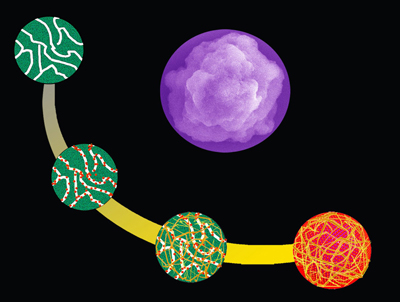When calcium carbonate microspheres act as templates, varied-sized microcontainers for medical substances can be created.
 Illustration of the production of colloid spheres. © Dr. X. Yan / MPI of Colloids and Interfaces
Illustration of the production of colloid spheres. © Dr. X. Yan / MPI of Colloids and Interfaces
Helmuth Möhwald and his associates from the Max Planck Institute of Colloids and Interfaces in Potsdam-Golm have created a simple technique for constructing drug containers that can channel a selected target into the body. The researchers selected porous calcium carbonate microspheres to act as templates for creating hollow 3-D balls. These balls are capable of absorbing medically effective substances. Their surface are attached with several signalling molecules and therefore directs the spheres to the diseased tissue.
In Chemotherapy, the toxic substances damage healthy tissue while inhibiting the growth of the tumour cells. Hence, Microspheres or nanospheres capable of specifically and precisely delivering drugs to targeted areas of the body are required. Researchers at the Max Planck Institute of Colloids and Interfaces developed a method that creates such spheres in varied sizes and functions.
Calcium carbonate templates similar to drug containers in size were selected, followed by formulating CaCO3 particles in accurate sizes ranging from a few hundred nanometres to several micrometres. The pores of the calcium carbonate spheres will then be filled with nanoparticles or with medical substances for different functions.
The CaCO3 spheres were then filled with a web including long alternate protein chains. This was demonstrated by the Potsdam-based researchers. The CaCO3 template can then be dissolved using an acid. The nanoparticles will be involuntarily organized within the porous sphere enclosed in the protein web. The protein web may contain biochemical signalling substances that direct the spheres to their target in the body.
Other methods can also be feasible for the production of micro- and nanocontainers effective for drug delivery. The Max Planck researcher and his colleagues in Potsdam have successfully completed a major step for targeted drug delivery.